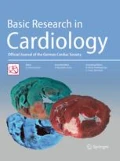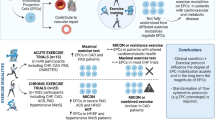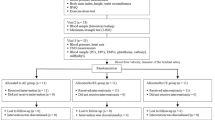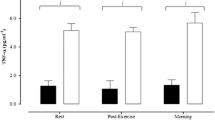Abstract
Alterations in circulating angiogenic cells (CAC) and endothelial progenitor cells (EPC), known to contribute to endothelial repair, could explain the reversal of endothelial function in response to exercise training. Moreover, training-induced vascular remodeling might affect the acute response of EPC and CAC following a single exercise bout. We studied the impact of exercise training on CAC function and numbers of CD34+/KDR+ EPC in patients with chronic heart failure (CHF) and we assessed the effect of acute exercise on CAC and EPC in sedentary and trained patients. Twenty-one sedentary CHF patients underwent 6-month exercise training and were compared to a non-trained control group (n = 17) and 10 healthy age-matched subjects. At baseline and follow-up, flow-mediated dilation was assessed and graded exercise testing (GXT) was performed. Before and immediately after GXT, CAC migratory capacity was assessed in vitro and circulating CD34+/KDR+ EPC were quantified using flow cytometry. At baseline, CAC migration was significantly impaired in sedentary CHF patients but normalized acutely after GXT. Training corrected endothelial dysfunction, which coincided with a 77% increase in CAC migration (P = 0.0001). Moreover, the GXT-induced improvement detected at baseline was no longer observed after training. Numbers of CD34+/KDR+ EPC increased following 6-month exercise training (P = 0.021), but were not affected by GXT, either prior or post-training. In conclusion, the present findings demonstrate for the first time that exercise training in CHF reverses CAC dysfunction and increases numbers of CD34+/KDR+ EPC, which is accompanied by improvement of peripheral endothelial function. The acute exercise-induced changes in CAC function wane with exercise training, suggesting that repetitive exercise bouts progressively lead to functional endothelial repair.






Similar content being viewed by others
References
Adams V, Lenk K, Linke A, Lenz D, Erbs S, Sandri M, Tarnok A, Gielen S, Emmrich F, Schuler G, Hambrecht R (2004) Increase of circulating endothelial progenitor cells in patients with coronary artery disease after exercise-induced ischemia. Arterioscler Thromb Vasc Biol 24:684–690
Balligand JL, Feron O, Dessy C (2009) eNOS activation by physical forces: from short-term regulation of contraction to chronic remodeling of cardiovascular tissues. Physiol Rev 89:481–534
Brehm M, Picard F, Ebner P, Turan G, Bolke E, Kostering M, Schuller P, Fleissner T, Ilousis D, Augusta K, Peiper M, Schannwell C, Strauer BE (2009) Effects of exercise training on mobilization and functional activity of blood-derived progenitor cells in patients with acute myocardial infarction. Eur J Med Res 14:393–405
Corretti MC, Anderson TJ, Benjamin EJ, Celermajer D, Charbonneau F, Creager MA, Deanfield J, Drexler H, Gerhard-Herman M, Herrington D, Vallance P, Vita J, Vogel R (2002) Guidelines for the ultrasound assessment of endothelial-dependent flow-mediated vasodilation of the brachial artery: a report of the International Brachial Artery Reactivity Task Force. J Am Coll Cardiol 39:257–265
Dernbach E, Randriamboavonjy V, Fleming I, Zeiher AM, Dimmeler S, Urbich C (2008) Impaired interaction of platelets with endothelial progenitor cells in patients with cardiovascular risk factors. Basic Res Cardiol 103:572–581
Ennezat PV, Malendowicz SL, Testa M, Colombo PC, Cohen-Solal A, Evans T, LeJemtel TH (2001) Physical training in patients with chronic heart failure enhances the expression of genes encoding antioxidative enzymes. J Am Coll Cardiol 38:194–198
Friedrich EB, Werner C, Walenta K, Bohm M, Scheller B (2009) Role of extracellular signal-regulated kinase for endothelial progenitor cell dysfunction in coronary artery disease. Basic Res Cardiol 104:613–620
Geft D, Schwartzenberg S, Rogowsky O, Finkelstein A, Ablin J, Maysel-Auslender S, Wexler D, Keren G, George J (2008) Circulating apoptotic progenitor cells in patients with congestive heart failure. PLoS ONE 3:e3238
Green DJ, Maiorana A, O’Driscoll G, Taylor R (2004) Effect of exercise training on endothelium-derived nitric oxide function in humans. J Physiol 561:1–25
Hambrecht R, Adams V, Erbs S, Linke A, Krankel N, Shu Y, Baither Y, Gielen S, Thiele H, Gummert JF, Mohr FW, Schuler G (2003) Regular physical activity improves endothelial function in patients with coronary artery disease by increasing phosphorylation of endothelial nitric oxide synthase. Circulation 107:3152–3158
Haram PM, Kemi OJ, Wisloff U (2008) Adaptation of endothelium to exercise training: insights from experimental studies. Front Biosci 13:336–346
Heeschen C, Lehmann R, Honold J, Assmus B, Aicher A, Walter DH, Martin H, Zeiher AM, Dimmeler S (2004) Profoundly reduced neovascularization capacity of bone marrow mononuclear cells derived from patients with chronic ischemic heart disease. Circulation 109:1615–1622
Heiss C, Keymel S, Niesler U, Ziemann J, Kelm M, Kalka C (2005) Impaired progenitor cell activity in age-related endothelial dysfunction. J Am Coll Cardiol 45:1441–1448
Keymel S, Kalka C, Rassaf T, Yeghiazarians Y, Kelm M, Heiss C (2008) Impaired endothelial progenitor cell function predicts age-dependent carotid intimal thickening. Basic Res Cardiol 103:582–586
Kissel CK, Lehmann R, Assmus B, Aicher A, Honold J, Fischer-Rasokat U, Heeschen C, Spyridopoulos I, Dimmeler S, Zeiher AM (2007) Selective functional exhaustion of hematopoietic progenitor cells in the bone marrow of patients with postinfarction heart failure. J Am Coll Cardiol 49:2341–2349
Lang RM, Bierig M, Devereux RB, Flachskampf FA, Foster E, Pellikka PA, Picard MH, Roman MJ, Seward J, Shanewise JS, Solomon SD, Spencer KT, Sutton MS, Stewart WJ (2005) Recommendations for chamber quantification: a report from the American Society of Echocardiography’s Guidelines and Standards Committee and the Chamber Quantification Writing Group, developed in conjunction with the European Association of Echocardiography, a branch of the European Society of Cardiology. J Am Soc Echocardiogr 18:1440–1463
Lauer T, Heiss C, Balzer J, Kehmeier E, Mangold S, Leyendecker T, Rottler J, Meyer C, Merx MW, Kelm M, Rassaf T (2008) Age-dependent endothelial dysfunction is associated with failure to increase plasma nitrite in response to exercise. Basic Res Cardiol 103:291–297
Laufs U, Werner N, Link A, Endres M, Wassmann S, Jurgens K, Miche E, Bohm M, Nickenig G (2004) Physical training increases endothelial progenitor cells, inhibits neointima formation, and enhances angiogenesis. Circulation 109:220–226
Lee BC, Hsu HC, Tseng WY, Su MY, Chen SY, Wu YW, Chien KL, Chen MF (2009) Effect of cardiac rehabilitation on angiogenic cytokines in postinfarction patients. Heart 95:1012–1018
Rognmo O, Bjornstad TH, Kahrs C, Tjonna AE, Bye A, Haram PM, Stolen T, Slordahl SA, Wisloff U (2008) Endothelial function in highly endurance-trained men: effects of acute exercise. J Strength Cond Res 22:535–542
Sandri M, Adams V, Gielen S, Linke A, Lenk K, Krankel N, Lenz D, Erbs S, Scheinert D, Mohr FW, Schuler G, Hambrecht R (2005) Effects of exercise and ischemia on mobilization and functional activation of blood-derived progenitor cells in patients with ischemic syndromes: results of 3 randomized studies. Circulation 111:3391–3399
Sarto P, Balducci E, Balconi G, Fiordaliso F, Merlo L, Tuzzato G, Pappagallo GL, Frigato N, Zanocco A, Forestieri C, Azzarello G, Mazzucco A, Valenti MT, Alborino F, Noventa D, Vinante O, Pascotto P, Sartore S, Dejana E, Latini R (2007) Effects of exercise training on endothelial progenitor cells in patients with chronic heart failure. J Card Fail 13:701–708
Sun C, Liang C, Ren Y, Zhen Y, He Z, Wang H, Tan H, Pan X, Wu Z (2009) Advanced glycation end products depress function of endothelial progenitor cells via p38 and ERK 1/2 mitogen-activated protein kinase pathways. Basic Res Cardiol 104:42–49
Suvorava T, Kojda G (2007) Prevention of transient endothelial dysfunction in acute exercise: a friendly fire? Thromb Haemost 97:331–333
Theiss HD, David R, Engelmann MG, Barth A, Schotten K, Naebauer M, Reichart B, Steinbeck G, Franz WM (2007) Circulation of CD34+ progenitor cell populations in patients with idiopathic dilated and ischaemic cardiomyopathy (DCM and ICM). Eur Heart J 28:1258–1264
Thijssen DH, Vos JB, Verseyden C, van Zonneveld AJ, Smits P, Sweep FC, Hopman MT, de Boer HC (2006) Haematopoietic stem cells and endothelial progenitor cells in healthy men: effect of aging and training. Aging Cell 5:495–503
Tinken TM, Thijssen DH, Black MA, Cable NT, Green DJ (2008) Time course of change in vasodilator function and capacity in response to exercise training in humans. J Physiol 586:5003–5012
Valgimigli M, Rigolin GM, Fucili A, Porta MD, Soukhomovskaia O, Malagutti P, Bugli AM, Bragotti LZ, Francolini G, Mauro E, Castoldi G, Ferrari R (2004) CD34+ and endothelial progenitor cells in patients with various degrees of congestive heart failure. Circulation 110:1209–1212
Van Craenenbroeck EM, Beckers PJ, Possemiers NM, Wuyts K, Frederix G, Hoymans VY, Wuyts F, Paelinck BP, Vrints CJ, Conraads VM (2010) Exercise acutely reverses dysfunction of circulating angiogenic cells in chronic heart failure. Eur Heart J. doi:10.1093/eurheartj/ehq058
Van Craenenbroeck EM, Vrints CJ, Haine SE, Vermeulen K, Goovaerts I, Van Tendeloo VF, Hoymans VY, Conraads VM (2008) A maximal exercise bout increases the number of circulating CD34+/KDR+ endothelial progenitor cells in healthy subjects. Relation with lipid profile. J Appl Physiol 104:1006–1013
Vasa M, Fichtlscherer S, Aicher A, Adler K, Urbich C, Martin H, Zeiher AM, Dimmeler S (2001) Number and migratory activity of circulating endothelial progenitor cells inversely correlate with risk factors for coronary artery disease. Circ Res 89:E1–E7
Wassmann S, Werner N, Czech T, Nickenig G (2006) Improvement of endothelial function by systemic transfusion of vascular progenitor cells. Circ Res 99:e74–e83
Yamaguchi J, Kusano KF, Masuo O, Kawamoto A, Silver M, Murasawa S, Bosch-Marce M, Masuda H, Losordo DW, Isner JM, Asahara T (2003) Stromal cell-derived factor-1 effects on ex vivo expanded endothelial progenitor cell recruitment for ischemic neovascularization. Circulation 107:1322–1328
Acknowledgments
The study was supported by the University of Antwerp, the Fund for Scientific Research (FWO-Flanders) and the Institute for Science and Technology (IWT). EVC and PB are supported by FWO as PhD fellows and VC as a clinical Postdoctoral fellow. We acknowledge technical assistance from G. Frederix regarding cell culture, from J. Roeykens regarding exercise testing and from I. Goovaerts and G. Ennekens regarding endothelial function assessments.
Conflict of interest statement
The authors declare that they have no conflicts of interest.
Author information
Authors and Affiliations
Corresponding author
Rights and permissions
About this article
Cite this article
Van Craenenbroeck, E.M., Hoymans, V.Y., Beckers, P.J. et al. Exercise training improves function of circulating angiogenic cells in patients with chronic heart failure. Basic Res Cardiol 105, 665–676 (2010). https://doi.org/10.1007/s00395-010-0105-4
Received:
Revised:
Accepted:
Published:
Issue Date:
DOI: https://doi.org/10.1007/s00395-010-0105-4




